-
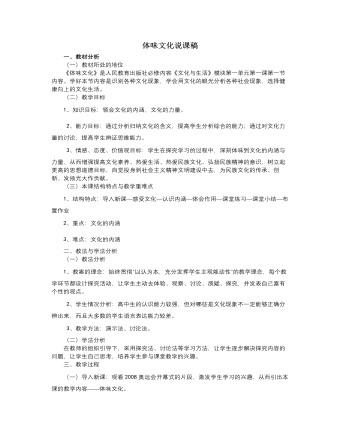
人教版高中政治必修3体味文化说课稿
3、文化的力量。为了使学生能辨证地分析文化的力量,我设计了两个问题进行探讨:(1)是不是任何文化都能起促进作用?(2)你在听或唱国歌时感受到一种什么样的力量?这样,学生在对比中学会辨证地分析文化的力量——先进的、健康的文化能促进社会发展和个人成长;落后的、腐朽的文化则阻碍社会发展和个人成长。同时还能提高学生的文化赏析能力,从而引导学生装自觉参加健康有益的文化活动,抵制不良文化的影响,投身到社会主义精神文明建设中去。关于课堂练习,我准备了5个针对性比较强的选择题,从而加深巩固本框题的重难点知识。最后,播放歌曲《走进新时代》,展示本课知识结构,指出本框题需重点掌握的问题,结束本课教学。课后作业,我设计了这样一个辨析的题目:文化是人们创造的全部财富的总和,它是人类特有的现象。
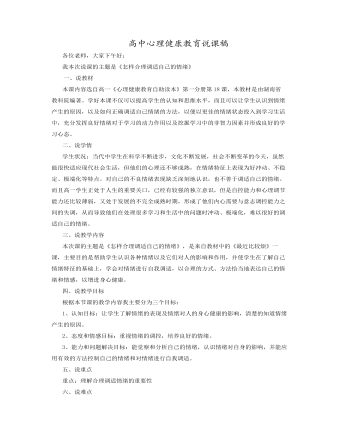
高中心理健康教育说课稿
二、说学情学生状况:当代中学生在科学不断进步,文化不断发展,社会不断变革的今天,虽然能很快适应现代社会生活,但他们的心理还不够成熟,在情绪特征上表现为好冲动、不稳定、极端化等特点。对自己的不良情绪表现缺乏深刻地认识,也不善于调适自己的情绪。而且高一学生正处于人生的重要关口,已经有较强的独立意识,但是自控能力和心理调节能力还比较薄弱,又处于发展的不完全成熟时期,形成了他们内心需要与意志调控能力之间的失调,从而导致他们在处理很多学习和生活中的问题时冲动、极端化,难以很好的调适自己的情绪。
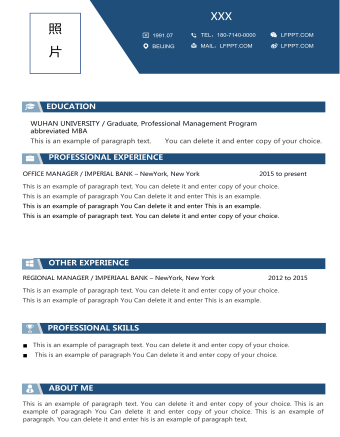
个人求职英文简历模板
OFFICE MANAGER / IMPERIAL BANK – NewYork, NewYork 2015 to presentThis is an example of paragraph text. You can delete it and enter copyof your choice. This is an example of paragraph You Can delete it and enter This is anexample. This is anexample of paragraph You Can delete it and enter This is an example. This is anexample of paragraph text. You can delete it and enter copy of your choice.
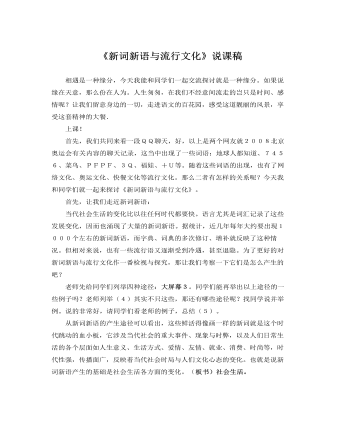
人教版高中语文必修1《新词新语与流行文化》说课稿
当代社会生活的变化比以往任何时代都要快。语言尤其是词汇记录了这些发展变化,因而也涌现了大量的新词新语。据统计,近几年每年大约要出现1000个左右的新词新语,而字典、词典的多次修订、增补就反映了这种情况。但相对来说,也有一些流行语又逐渐受到冷遇,甚至退隐。为了更好的对新词新语与流行文化作一番检视与探究,那让我们考察一下它们是怎么产生的吧?老师先给同学们列举四种途径:大屏幕3。同学们能再举出以上途径的一些例子吗?老师列举(4)其实不只这些,那还有哪些途径呢?找同学说并举例。说的非常好,请同学们看老师的例子,总结(5)。从新词新语的产生途径可以看出,这些鲜活得像画一样的新词就是这个时代跳动的血小板,它涉及当代社会的重大事件、现象与时弊,以及人们日常生活的各个层面如人生意义、生活方式、爱情、友情、就业、消费、时尚等,时代性强,传播面广,反映着当代社会时局与人们文化心态的变化。
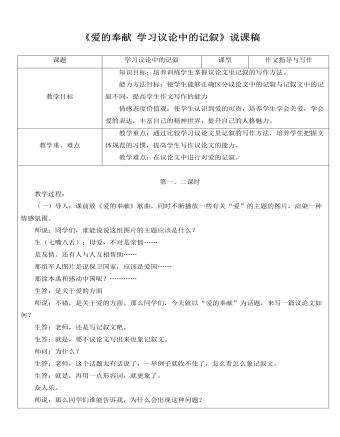
人教版高中语文必修3《爱的奉献 学习议论中的记叙》说课稿
教学过程:(一)导入:课前放《爱的奉献》歌曲,同时不断播放一些有关“爱”的主题的图片,渲染一种情感氛围。师说:同学们,谁能说说这组图片的主题应该是什么?生(七嘴八舌):母爱,不对是亲情……是友情、还有人与人互相帮助……那组军人图片是说保卫国家,应该是爱国……那徐本禹和感动中国呢?…………生答:是关于爱的方面师说:不错,是关于爱的方面。那么同学们,今天就以“爱的奉献”为话题,来写一篇议论文如何?生答:老师,还是写记叙文吧。生答:就是,要不议论文写出来也象记叙文。师问:为什么?生答:老师,这个话题太有话说了,一举例子就收不住了,怎么看怎么象记叙文。生答:就是,再用一点形容词,就更象了。众人乐。师说:那么同学们谁能告诉我,为什么会出现这种问题?一生小声说:还不是我们笨,不会写。师说:不是笨,也不是不会写,你们想为什么记叙文就会写,一到议论文就不会了,那是因为同学们没有明白议论文中的记叙与记叙文中的记叙有什么不同,所以一写起议论文中的记叙,还是按照记叙文的写法写作,这自然就不行了。那好,今天我们就从如何写议论文中的记叙讲起。

人教版高中语文必修1《黄河九曲:写事要有点波澜》说课稿
二、说学生本届高一学生经过了三年初中课改,在心理上,他们渴望表现的欲望和自主探究的欲望比较强烈,对有兴趣的知识表现出高度地热情,并具有一定的团结协作能力,但还是应该正视一个并不乐观的现实——在写作方面,学生知识还停留在简单的记叙及表达方式综合运用上,至于巧妙构思、谋篇布局很是空白。即便已经经过高中一个学期的学习,但还是有大部分学生依然基础较为薄弱,甚至出现不知从何下笔的现象。三、说教法与学法“老师搭台,学生唱戏”1、教法:本课将安排两课时(一课时学习一课时练笔),采用 PPT 多媒体课件教学,尝试用角色扮演法、图片展示法和多媒体教学等方法,教学中应该重视学生的参与性和探究性。2、学法:学生应该充分利用多角度创设的学习情境来激发自身学习的兴趣和热情,分组讨论,小组互助等形式让学生积极自主参与、进行问题探究学习。理论依据:建构主义理论“学生是学习的中心”的阐释,教师应该做学生主动建构意义的帮助者、促进者。
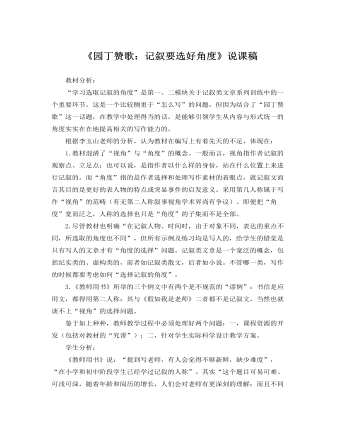
人教版高中语文必修1《园丁赞歌:记叙要选好角度》说课稿
在学习语文经验交流会上,季老师举着我的《采花酿蜜集》,对大家说:“人日积月累辛勤采撷,终于酿出了知识的琼浆。大家都应这样,争做知识的富户啊!”老师有点激动,低低地爬在鼻梁上的眼镜突然滑了下来,正好落在那集子上。大家笑了,季老师也笑了。就这样,我的写作有了进步,好几篇作文登上了班级《学作园地》。从此,我爱上了语文,更深深地爱上了季老师。高中升学考前那个星期天的夜晚,季老师旧病复发,累倒了。半夜,老师们把他送进了公社卫生院。第二天,同学们都悄悄去卫生院看望。我去的时候,季老师正在挂滴流。可是,下午季老师又出现在讲台上,他脸色憔悴,声音沙哑……我手捧《采花酿蜜集》走近季老师,思绪的溪水从远方流了回来。“季老师”,我把本子捧给老师,深情地叫了声。季老师接过本子,仔细翻阅着,脸上露出了笑容,像是闻到了郁郁芳香的蜜汁似的。“进步不小呀!”季老师说着,又在本子扉页上题了
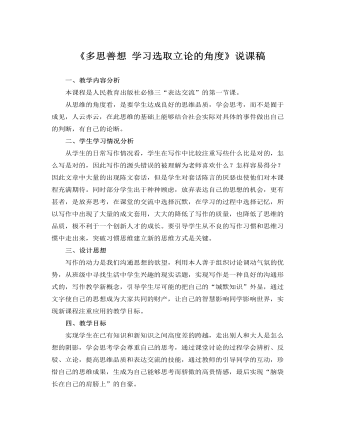
人教版高中语文必修3《多思善想 学习选取立论的角度》说课稿
谈到这,如果有人会说这仅仅是在于我个人与战场之上,战场之下另当别论,那么,他完全错了。在我小学四年级的语文课上有两个人发言积极,一个姓黄,一个姓康,黄同学发言比康同学更积极,班上的同学常以为黄同学是个了不得的人物,后来,教语文的吴老师曾悄悄地告诉我:班上真正厉害的是康x,那黄x没什么,说的全是“一点通”上的,照搬不误。说到这,我还得厚着脸皮自夸一下,在四年级时,我和康同学是同坐,一次,老师叫我们对一片课文(好象是写黄继光舍身炸暗堡)的一个段落提问题时,我悄悄地对康同学说了一个问题,康同学对我说:“你站起来说嘛。”内向的我遥遥头,康同学便站举手,并起来将我的问题大声地说了出来,结果老师说:“恩,康x的问题提得很好。”

新人教版高中英语必修2Unit 5 Music-Discovering Useful Structures教案二
4. When he got absorbed in his world of music, he felt as if he could “see” the beauty of the world around him, like he had in his previous life.P·P as adverbial: _________________________________________________________________.Function: _______________________________________________________________________.Step 5 Solid Complete the passage with the words in brackets in their correct forms.Well known as a successful band, the Impact members show quite a few striking qualities. They never ever give up. When _____________(question) by the media, they are not _____________(discourage) and practise even harder. They are improving themselves by attending several master training class. They are united. _____________(fill with) team spirit, they act as a whole, always aiming for glory. Step 6 Difference and similarity from -ingObserve the following examples.1. He went out, shutting the door behind him.=He went out, ________________________________________________________.2. Not knowing what to do, he went to his parents for help.=__________________________________________, he went to his parents for help.Similarity: _______________________________________________________________________________________________________________________________________________________.Difference : _______________________________________________________________________________________________________________________________________________________.Step Practice1. ________ in a hurry, this article was not so good. 因为写得匆忙, 这篇文章不是很好。2. ________ carefully, he found something he hadn’t known before. 他仔细读书时, 发现了一些从前不知道的东西。3. ________ why he did it, the monitor said it was his duty. 当被问及他为什么要这么做时, 班长说这是他的职责

新人教版高中英语必修2Unit 5 Music-Listening&Speaking&Talking教案
choir memberspeople to run food stands people to sell festival ticketspeople to sell music CDspeople to set up equipmentmusical performersStep 2: Listen to the announcement again and answer the questions. ? 1. What kind of songs will Grace Davis sing at the festival?? 2. Who can try out as a performer?? 3. What can those who think they do not have musical talent do?? 4. How can students volunteer to take part?? Talking about preferences:? Would you prefer doing ..?? What would you prefer to do?? Would you rather do .... or ….?? What would you rather do?? I'd prefer .... to ..? I'd rather have ... than .. Step 3: Speaking ProjectWork in groups. Role-play the conversation or make a new one.? Debbie: Where have you been? You missed the announcement about the music festival.? John: I was at the doctor's office. Music festival?? Frank: Yes, it's going to be next month on the school sports field. John, you can play the piano. How about playing it at the festival?? John: Well, I'd rather play the violin. I can play Liang Zhu.? Frank: Wow! Sounds good. What about you, Debbie? ? Debbie: Actually, I don't have much musical ability. I'd prefer just to help out with the crowds.? Frank: You can sell tickets or work at a food stand.? John: So can I assume that the aim of the festival is to raise money?? Debbie: Yes. All of the money will go to charity.

新人教版高中英语必修2Unit 5 Music-Listening and Speaking教案
This lesson is about music. Students can classify the types of music through the instruments and its sound and can talk about their preferences about music, even join some activities and play a role in them according to their musical talents. On the basis, they are guided to use the languages to express their preferences and some plosive sounds and their rules.1. Classify the music types through the instruments and its sound.2. Listen and understand what the speakers’ preferences are and the reasons; talk about their own preferences and give their own reasons, using these sentences: “What kind of music do you like? And why? “ “Because it makes/gives me energy/peaceful.../touches my heart...”.3. Learn some plosives and the rules.4. Join some activities and play a role in them according to the talents. 1. Listen and understand what the speakers’ preferences are and the reasons;2. talk about their own preferences and give their own reasons, using these sentences: “What kind of music do you like? And why? “ “Because it makes/gives me energy/peaceful.../touches my heart...”.3. Learn some plosives and incomplete plosives and its rules.Step 1 Lead inPoint at the pictures on P50 and ask Q1: What are the people doing in the pictures below?Q2: What kind of music they are?Then play the MP3s one by oneStep 2 ListeningTask 1: A reporter from the school newspaper is interviewing students about music. Listen to the interviews. Draw lines between the words to make complete sentences. Some words will not be used.

新人教版高中英语必修2Unit 5 Music-Reading and Thinking教案二
1. Get basic information about Eric; read deeply to understand the history and development of the virtual choir.2. Understand what the function of the virtual choir is and how to make a virtual choir.3. Understand the meaning of some languages in the context of the text through question guidance, such as “Many people do not have close friends or contacts who have the same interest in music.” and so on.Step 1 Leading-in1. Answer the following questions.Q1:Do you know the Apps like Tik Tok and Quick Hand?Q2: Do you want to make a Tik Tok video or a Quick Hand video?2. Play a Tik Tok video Step 2: Understanding the title Q1:What does the title mean ?Q2: Is the article a narration or exposition? Why? Q3: Can you change the title ? If you can, what is the title?Step 3: Scanning the whole text and getting the basic information1. Answer the following questions.Q1:Who came up with the idea for a virtual choir?Q2: Where did Eric studied the musical composition?Q3: What is his song?2. Find the main idea of each paragraph3. Deal with some new words.Step 4: Reading carefully to get detailed informationPara 1 How to make a virtual choir1. PreparationA. tools: a virtual camera; an Internet connectionB. hero/heroin: friends or some individuals who have the same interests2. Process
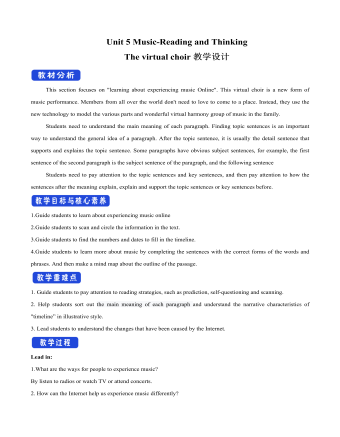
新人教版高中英语必修2Unit 5 Music-Reading and Thinking教案一
This section focuses on "learning about experiencing music Online". This virtual choir is a new form of music performance. Members from all over the world don't need to love to come to a place. Instead, they use the new technology to model the various parts and wonderful virtual harmony group of music in the family. Students need to understand the main meaning of each paragraph. Finding topic sentences is an important way to understand the general idea of a paragraph. After the topic sentence, it is usually the detail sentence that supports and explains the topic sentence. Some paragraphs have obvious subject sentences, for example, the first sentence of the second paragraph is the subject sentence of the paragraph, and the following sentenceStudents need to pay attention to the topic sentences and key sentences, and then pay attention to how the sentences after the meaning explain, explain and support the topic sentences or key sentences before.1.Guide students to learn about experiencing music online2.Guide students to scan and circle the information in the text.3.Guide students to find the numbers and dates to fill in the timeline.4.Guide students to learn more about music by completing the sentences with the correct forms of the words and phrases. And then make a mind map about the outline of the passage.1. Guide students to pay attention to reading strategies, such as prediction, self-questioning and scanning.2. Help students sort out the main meaning of each paragraph and understand the narrative characteristics of "timeline” in illustrative style.3. Lead students to understand the changes that have been caused by the Internet.

新人教版高中英语必修2Unit 5 Music-Reading for Writing教案二
The Internet celebrity Gao Yifeng. Years ago, he owned 5 companies and the staffs over 1,000, but during the economy crisis, he became nothing but debt. He was so worried that his hair became white overnight. There was a time when he wanted to killed himself. But after listening to the song Start Over by Liu Huan, he decided to cheer himself up. He started a steamed bun shop and gradually became a national chain shops. Now he became successful again.Walter Haddon said, “Music is the medicine of a troubled mind.” Music contains such a pleasant and inspiring force. Music gave him courage and bravery. When he listened to the song, it made his spirit fly like a kite in the wind. Music gave him strength and brought him relief. It was the rock I leant on to become strong and to get through those hard times. I hope none of us have to go through the same kind of suffering that he did. At the same time, we all go through various periods when we feel sad or alone. During those times, music can help us in the same way that it helped him. I hope we all will somehow begin to treasure music and make it a part of our life. Thank you for your listening !5.Revise your writing each other.Does he/she explain how music has changed his/her/someone else’s life?Are some of the rhetorical devices included and used properly ?Does he/she talk about how music makes him/her/someone feel?Is the first word in each sentences capitalised?Does he/she use correct punctuation ?

新人教版高中英语必修2Unit 5 Music-Discovering Useful Structures教案一
Step1:自主探究。1.(教材P52)Born(bear) in the USA on 2 January 1970, Whitacre began studying music at the University of Nevada in 1988.2.(教材P52) Moved(move) by this music, he said, “It was like seeing color for the first time.”3.(教材P56)I was very afraid and I felt so alone and discouraged(discourage).4.(教材P58)Encouraged(encourage) by this first performance and the positive reaction of the audience, I have continued to play the piano and enjoy it more every day.Step2:语法要点精析。用法1:过去分词作表语1).过去分词可放在连系动词be, get, feel, remain, seem, look, become等之后作表语,表示主语所处的状态Tom was astonished to see a snake moving across the floor.汤姆很惊讶地看到一条蛇正爬过地板。Finally the baby felt tired of playing with those toys.终于婴儿厌倦了玩那些玩具。注意:1).过去分词作表语时与被动语态的区别过去分词作表语时,强调主语所处的状态;而动词的被动语态表示主语是动作的承受者,强调动作。The library is now closed.(状态)图书馆现在关闭了。The cup was broken by my little sister yesterday.(动作)昨天我妹妹把杯子打碎了。2)感觉类及物动词的现在分词与过去分词作表语的区别过去分词作表语多表示人自身的感受或事物自身的状态,常译作“感到……的”;现在分词多表示事物具有的特性,常译作“令人……的”。
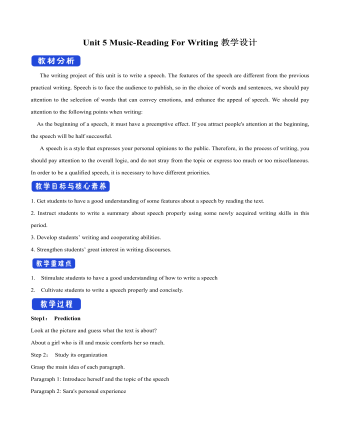
新人教版高中英语必修2Unit 5 Music-Reading For Writing教案一
(4)Now we have heard a number of outstanding speeches ... 我们已经聆听了许多精彩的发言……(5)Because we wanted the nations of the world, working together, to deal with ... 因为我们希望全世界各国团结起来去应对……(6)And if we do not act ... 如果我们不采取行动……(7)Now, I share the concerns that have been expressed ... 我也同意对于……表达的担心(8)Let us show the world that by working together we can ... 让我们告诉全世界,通过一起努力我们可以……(9)It is now time for us to ... 是时候我们……(10)And I have always wished that ... 我一直希望……(11)Thank you for letting me share this day with me.感谢你们和我共度这一天。实践演练:假如你是高中生李华,你校将举办一次以“音乐”为主题的演讲比赛,请你按照主题,写下你的演讲稿。注意:词数100左右。First of all, thank you for listening to my speech. My topic is: love music like love yourself.Music is like the air we need to maintain our normal lives around us. You can't imagine how terrible a world without music would be. Movies and TV shows have no music, only dry conversations and scenes; mobile phones only vibrations; streets only noisy crowds; cafes, western restaurants only depressed meals. What a terrible world it is!As a student, I hope we all can enjoy the fun brought by music in our spare time. Instead of just listening to music, we can even make our own music. Let's enjoy the fun of music!Thanks again for your attention!
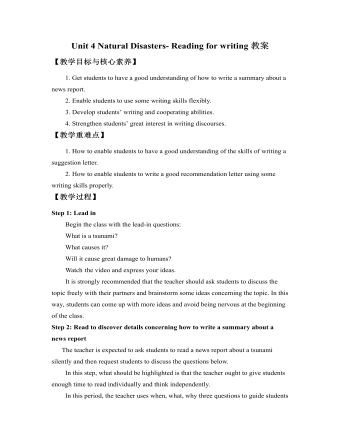
新人教版高中英语必修1Unit 4 Natural Disasters- Reading for writing教案
①标题——标题应当简洁明了。②导语——导语是消息开头的第一段或第一句话,简明扼要地揭示出消息的核心内容。③主体——主体是消息的主要部分,要用充足的事实表现主题,对导语的内容作进一步的展开和阐述。④结束语——通常是对全文内容进行概括性的总结。3. 新闻报道增分句子(1)陈述事实常用的句型:①A terrible storm hit/struck ... , killing ..②It was a cool autumn night when the earthquake happened. A large number of buildings fell down and roads were destroyed, leaving a great many people homeless.地震发生在一个凉爽的秋夜。大量的建筑物倒塌,道路被毁,许多人无家可归。③With the help of the rescue team, people who were the trapped in the flood were saved.在救援队的帮助下,困在洪水中的人们得救了。(2)陈述观点常用的句型:①Clearly/Obviously/In my opinion/It seemed that people were shocked.显然/在我看来/似乎人们震惊了。②The whole city was in ruins after the earthquake.地震后整个城市成了一片废墟。(3)揭示原因常用的句型:Because of/As a result of/Thanks to the help of the army, people who got injured were sent to the hospital immediately.
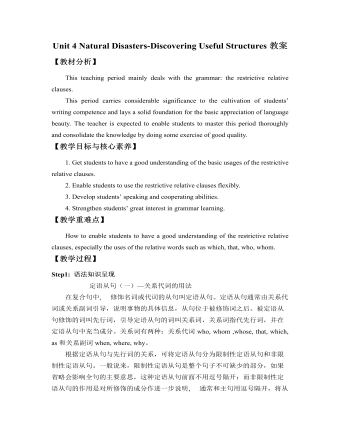
新人教版高中英语必修1Unit 4 Natural Disasters-Discovering Useful Structures教案
【教材分析】This teaching period mainly deals with the grammar: the restrictive relative clauses.This period carries considerable significance to the cultivation of students’ writing competence and lays a solid foundation for the basic appreciation of language beauty. The teacher is expected to enable students to master this period thoroughly and consolidate the knowledge by doing some exercise of good quality.【教学目标与核心素养】1. Get students to have a good understanding of the basic usages of the restrictive relative clauses.2. Enable students to use the restrictive relative clauses flexibly.3. Develop students’ speaking and cooperating abilities.4. Strengthen students’ great interest in grammar learning.【教学重难点】How to enable students to have a good understanding of the restrictive relative clauses, especially the uses of the relative words such as which, that, who, whom.【教学过程】Step1: 语法知识呈现定语从句(一)—关系代词的用法在复合句中, 修饰名词或代词的从句叫定语从句。定语从句通常由关系代词或关系副词引导,说明事物的具体信息,从句位于被修饰词之后。被定语从句修饰的词叫先行词,引导定语从句的词叫关系词,关系词指代先行词,并在定语从句中充当成分。关系词有两种:关系代词who, whom ,whose, that, which, as和关系副词when, where, why。
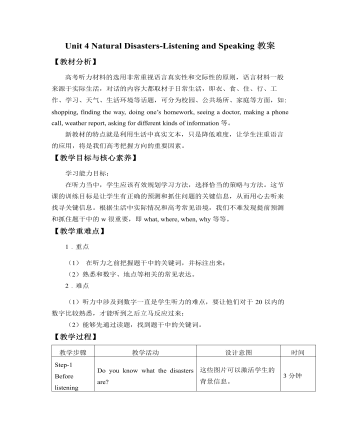
新人教版高中英语必修1Unit 4 Natural Disasters-Listening and Speaking教案
【教材分析】高考听力材料的选用非常重视语言真实性和交际性的原则,语言材料一般来源于实际生活,对话的内容大都取材于日常生活,即衣、食、住、行、工作、学习、天气、生活环境等话题,可分为校园、公共场所、家庭等方面,如: shopping, finding the way, doing one’s homework, seeing a doctor, making a phone call, weather report, asking for different kinds of information等。新教材的特点就是利用生活中真实文本,只是降低难度,让学生注重语言的应用,将是我们高考把握方向的重要因素。【教学目标与核心素养】学习能力目标:在听力当中,学生应该有效规划学习方法,选择恰当的策略与方法。这节课的训练目标是让学生有正确的预测和抓住问题的关键信息,从而用心去听来找寻关键信息。根据生活中实际情况和高考常见语境,我们不难发现提前预测和抓住题干中的w很重要,即what, where, when, why等等。
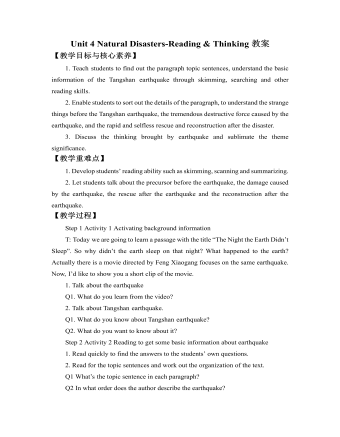
新人教版高中英语必修1Unit 4 Natural Disasters-Reading & Thinking教案
5. Read to get detailed information about Paragraph 5.Q1. What shows the revival of Tangshan?Q2. How can Tangshan revive itself and get up on its feet again?Q3. In times of disasters, how can we go through it?T: In times of disasters, we should unify, show the wisdom and stay positive.Step 4 Activity 4 Highlighting the theme and reflecting1. Make a summary of the text.2. Further understand the titleQ: After our learning, why do you think the earth didn’t sleep on that night?T: An earthquake happened. The people in the earthquake suffered a lot, and the people outside Tangshan were concerned about the people there a lot.3. Reflect through discussion on what can be learnt after reading.T: Disasters are powerful. Unpreparedness can be deadly. Life is weak, but if people work together to help each other, disasters can be defeated.There is no love from disaster, but we have love in the human heart.Step 5 Assignment How does the writer convey that the earthquake was deadly, and that people were helpless during the earthquake? Try to find some attractive and impressive expressions and note them down.